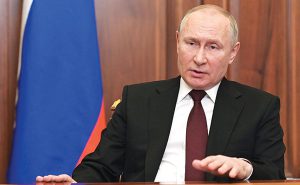Bloomberg
US and European governments threatened new sanctions after Russian President Vladimir Putin recognised two self-proclaimed separatist republics in eastern Ukraine and ordered troops sent to them in the latest escalation of Moscow’s standoff with the West.
Russia gave no details on how many “peacekeeping†troops might go into the breakaway regions of Donetsk and Luhansk, or when, as the US and its allies continue to warn Moscow could soon start a full-scale invasion. Russia denies it plans any invasion of its neighbour. Treaties Putin signed with separatist leaders allow Russia to deploy forces and build military bases on their territory.
European natural gas prices surged as oil closed on $100 a barrel and Russian shares tumbled on the signs of further tensions. The Kremlin move raised the stakes with the West but so far falls short of the massive invasion of large areas of Ukrainian territory that US and other officials have said is possible.
At the same time, more than 150,000 Russian troops remain massed near Ukraine’s borders, according to Western estimates. A senior US official said Russia is continuing to prepare for military action that could occur in the coming hours or days.
A key unknown is whether Russian “peacekeepers†would stop at the line of contact between separatists and the Ukrainian military.
President Joe Biden issued an executive order prohibiting US investment, trade, and financing to separatist regions of Ukraine, and Ambassador Linda Thomas-Greenfield said additional American sanctions against Russia would be coming. The UK is set to impose sanctions on Russia, while the European Union will start the process of agreeing penalties for Putin’s actions.
For the moment, western officials indicated that Russia’s recognition wasn’t a dramatic enough step to prompt the severe economic sanctions threatened in case of a full-scale invasion. A senior administration official told reporters the sanctions currently planned are separate from the more severe economic measures the Biden administration has said it would impose should Putin move forward with an invasion.
“It’s not yet the invasion our partners have been talking about,†Lithuanian Foreign Minister Gabrielius Landsbergis told reporters in Paris.
“But it’s a very steep escalation of the situation.†He said the EU’s actions could include sanctioning individuals responsible for the move, as well as a ban on European companies from operating in the occupied regions.
Russia’s latest move generated condemnation from the US, EU and nearly all representatives of the United Nations Security Council. China’s ambassador to the UN, Zhang Jun, called on all sides to exercise restraint.
The US said the White House was still open to a meeting between Biden and Putin — predicated on Russia not proceeding with an attack. Secretary of State Antony Blinken is scheduled to meet with Foreign Minister Sergei Lavrov in Geneva to discuss the crisis.
EU foreign policy chief Josep Borrell told reporters that foreign ministers would hold an emergency council in Paris to make a decision on sanctions.
 The Gulf Time Newspaper One of the finest business newspapers in the UAE brought to you by our professional writers and editors.
The Gulf Time Newspaper One of the finest business newspapers in the UAE brought to you by our professional writers and editors.
